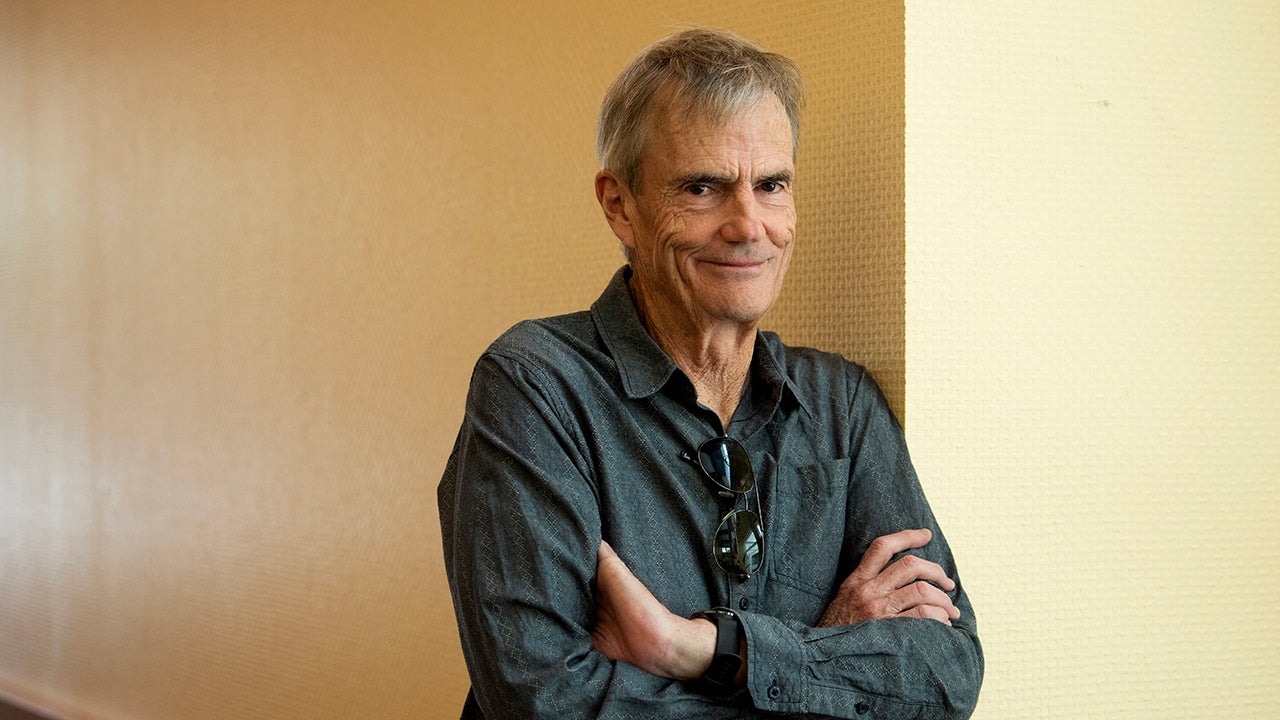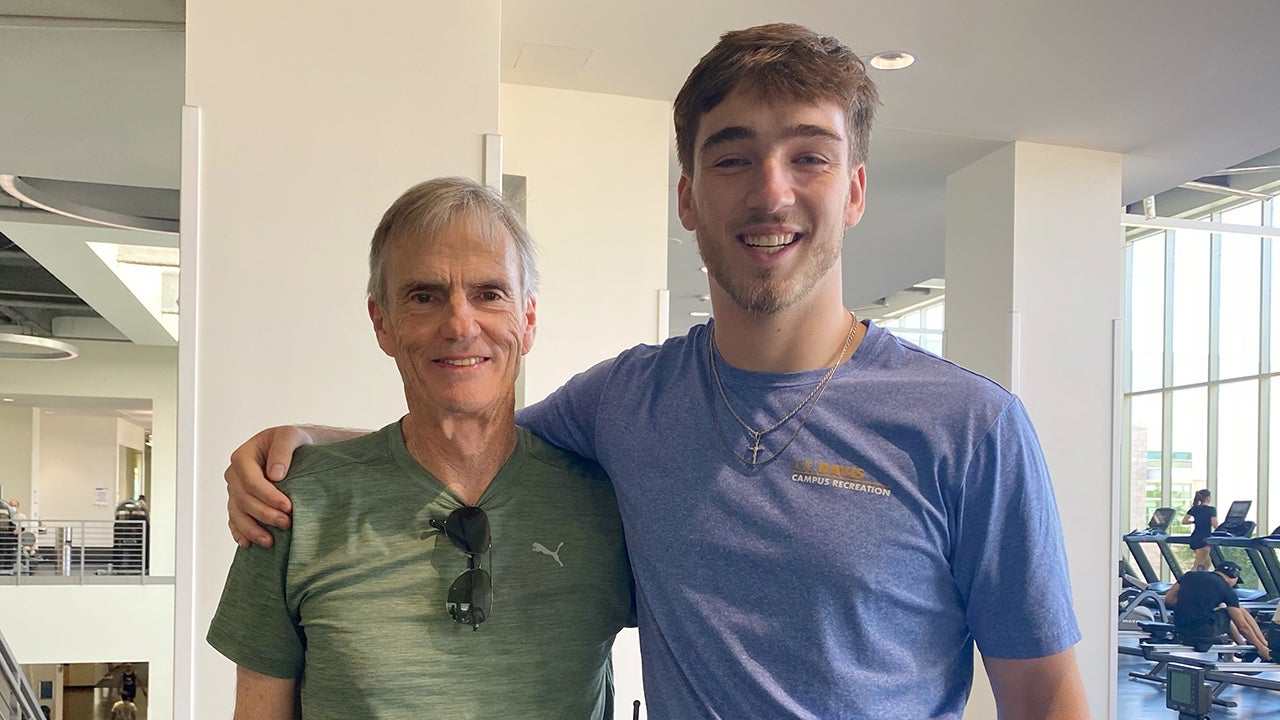Nick Tyler renewed his mandatory CPR and AED, or automated external defibrillator, certifications just two days before he met Bill Cocke at the ARC.
Good thing, we can all agree.
In January when Cocke, then 70, was working out and his heart stopped, Tyler was one of three Campus Recreation student employees who came to the rescue.
“It was so fresh and so perfect,” Tyler, a rising junior from Novato, California, said about his CPR knowledge and the timing of the recertification course.
Tyler, his fellow student employees Itzel Del Rio and Abigail Lynch, and four members of the UC Davis Fire Department were honored at a campus luncheon attended by Cocke and family members June 17. Those from the fire department are Captains Kyle Dubs and Paul Rush, Firefighter Jon Poganski and Student Firefighter Cameron Davainis ’23.
The incident demonstrates the power of the life-saving training mandatory for all Campus Recreation employees and available free of charge to all students — something that has helped earn the campus special distinction from the National Collegiate Emergency Medical Services Foundation.
A grateful patron and family
“I cannot express how thankful I am for the help multiple people gave me after my cardiac arrest,” Cocke said. “UC Davis students, ARC staff and the UC Davis Fire Department personnel saved my life — not to mention the ambulance and UC Davis Health.”

He is the father of Leah Hibel, professor of human ecology, and father-in-law of her husband, Jacob Hibel, associate professor of sociology. “We are so incredibly grateful for UC Davis, the students, the first responders, the docs, the nurses — everyone involved in saving my dad’s life!” Leah Hibel said.
In January, Cocke and his wife, Sandra, had begun one of their six-month stays in Davis that they alternate with time in Washington, D.C., to be with their children and grandchildren in both places. Retired from 33 years as a financial manager with IBM, Cocke works part-time as a project manager with the Anacostia Watershed Society in Bladensburg, Maryland.
Students act fast
Shortly before noon on Jan. 21, Cocke was working out on a rowing machine on the second floor of the ARC. He has no memory of what happened next.
But Tyler, a recreation attendant, and the other two students, Del Rio, now a rising senior, and Lynch, who graduated this month, recalled how fast things happened.
They were moving sports nets to the back of the large gym on the main floor when Del Rio, a building supervisor, heard the call over the radio: Someone on the second floor had passed out.
Most often, that means someone is dehydrated and almost immediately regains consciousness.
After learning the location, Del Rio and Tyler quickly headed upstairs. “I had a feeling something was wrong,” Del Rio said.
AED and CPR
Someone had already called 911 and was on a mobile phone with a public safety dispatcher. Tyler said he was certified in CPR and took the phone.
Tyler tapped Cocke and shouted at him. He was not responsive. Tyler could not locate a pulse, and Cocke was not breathing.
Tyler followed the dispatcher’s instructions to remove Cocke’s shirt and prepare to use an AED.
Del Rio went to get the nearest portable AED — she had memorized the location of all five at the ARC.
The device, used by bystanders and trained emergency responders, provides step-by-step instructions to use it to shock the heart of a person suffering a cardiac arrest to return the heart to a normal rhythm.
On her return, Del Rio placed the pads on Cocke’s chest and turned the AED on. It administered the shock.
At Del Rio’s direction, Tyler began cardiopulmonary resuscitation by making compressions to Cocke’s chest to keep his heart pumping. Thinking of the Bee Gees’ hit “Stayin’ Alive” to help time the compressions, Del Rio counted them aloud for Tyler.
Around the 10th compression, Tyler and Del Rio heard what they thought were Cocke’s ribs cracking — something that can happen when compressions are administered with enough force to be effective.
“This is blurred to me because it felt like forever and no time at all,” Tyler said.
Moments earlier, Del Rio had radioed Lynch, a building supervisor filling in as a recreation attendant. Lynch told the front desk to help clear the way for the crew from the fire department and direct them upstairs. She brought an incident form to Del Rio. Then she directed bystanders back, moved the rowing equipment out of the way and waved the fire crew up the stairs.
Fire crew arrives
Tyler was on his 20th compression when the fire crew took over Cocke’s care. They used their own defibrillator and administered high-performance CPR, which involves performing compressions at the proper depth and rate while making sure to not lean on the chest and keeping interruptions to a minimum.
Chief Nathan Trauernicht said the campus fire department played a leading role in bringing the CPR technique to the region.
Lynch had the elevator ready when Cocke was taken out of the building. He was transferred by ambulance to the UC Davis Medical Center.
Then Lynch helped a UC Davis police officer identify Cocke and get information to call his emergency contact. Using the ARC’s computer system, they looked through the digital records of patrons who had entered the ARC mid-morning, and Lynch recognized him.
Cocke said he had 20 minutes of CPR before his heart started again, and that it stopped again in the emergency room.
‘Really good CPR’
“All the doctors I saw at the UC Davis Medical Center in Sacramento during my 16-day stay after the incident told me I was ‘lucky’ and that I was given ‘really good CPR,’” Cocke said.
According to a 2020 report by the American Heart Association, nearly 90% of cardiac arrests that happen outside of hospitals are fatal. Timely administration of an AED shock and CPR is critical. Even those patients who survive a cardiac arrest may experience medical problems, including impaired consciousness and cognitive deficits.
Emotional impact
“It really caught me off guard how impacted I felt,” said Tyler, who is majoring in science and technology studies. He called his father, who is chief of the Novato Fire District. “He was excited. It’s what he does,” the son said. “He said we were a link in the chain of survival.”
Del Rio, who is double majoring in sociology and Chicana/Chicano studies, said she held it together until she got to a backroom. She called back home to San Juan Bautista, California, and talked to her brother.
More than a week passed before Del Rio learned that Cocke had survived. “I cried,” she said. “I felt this sense of relief. I helped with that.
“We didn’t hesitate,” Del Rio added. “That’s what they say makes the difference.”

Meeting the students — again
Cocke has completed 36 sessions of cardiac rehabilitation and is back to exercising. “I am much stronger than I was three months ago,” he said. “But I am not quite back to where I was in January before the arrest.”
Cocke tried to meet the three students on his visits to the ARC. He connected with Tyler. “I walked him up to where it happened, told him exactly what happened and gave him a hug,” Tyler said. “It makes you realize how special life is.”
“Recreation is all fun and mental health and well being,” said Lynch, a Temecula, California, resident who graduated with a degree in human development and a minor in psychology. “But there’s that rare chance someone may need your help.”
Distinction among universities
Deb Johnson, who oversees more than 30 career staff and nearly 625 student employees as director of Campus Recreation, said it is important staff is trained to deal with emergencies and to minimize risk for participants. “It is rewarding when the training that has been put into place is executed and has such a positive outcome,” she added. “We are very proud of our students and the way they handled this incident.”
All Campus Recreation career and student staff are CPR/AED certified. Among its free safety courses, Campus Recreation funds a program for all students to earn first-aid, Stop the Bleed, and CPR/AED certifications for free through the campus fire department’s EMS/Pre-hospital Care Division. Trauernicht said the fire department is an American Heart Association regional training center that has trained thousands in CPR over the last decade and more than 700 last year alone.
The fire department coordinates the implementation of the program to place AEDs throughout the campus. Since 2006 more than 120 AEDs, including the five at the ARC, have been placed in public locations across campus.
Through the efforts of fire department, UC Davis won recognition in 2018 from the National Collegiate Emergency Medical Services Foundation as a HEARTSafe institution for things like rapid response by first responders trained in CPR/AED, public access to defibrillation, and public CPR/AED training for the community. It is the only West Coast university that currently holds the distinction.
The fire department presented the students with its Everyday Heroes award and the members of the fire crew with its Phoenix Award for excellence in collaborative efforts in delivery of lifesaving resuscitation.
